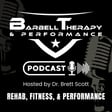
What are the risks of ozempic and other glp-1 inhibitors?
In this episode of the Barbell Therapy Podcast, Dr. Brett Scott sits down with women’s health nurse practitioner Laura Brown to explore the growing use of Ozempic and GLP-1 inhibitors in weight management and hormonal health. They break down how these medications work, who they’re best suited for, and why lifestyle changes are critical for long-term success. The conversation dives into hormone replacement therapy (HRT), muscle and bone health in menopause, and the importance of addressing sarcopenia and osteopenia. Laura also discusses continuous glucose monitoring, cultural views on weight loss, and side effects like “Ozempic face.”
Tune in for a thoughtful, holistic take on modern women’s health and how to achieve sustainable wellness.
KEYWORDS:
Ozempic, GLP-1 inhibitors, women's health, menopause, hormone therapy, weight loss, health coaching, lifestyle changes, diabetes, wellness, menopause, sarcopenia, osteopenia, diabetes, GLP-1, weight loss, health interventions, continuous glucose monitoring, off-label use, Ozempic face
TAKEAWAYS:
Ozempic is a useful tool for weight management.
The drug works by slowing digestion and affecting satiety.
Candidates for Ozempic include those with metabolic issues.
Lifestyle changes are crucial for sustainable weight loss.
HRT can be preventative for osteoporosis and cardiovascular disease.
Education on medication use is essential for patients.
Exercise should be viewed as a privilege, not a punishment.
Patients need to be informed about potential side effects.
Weight loss medications should not be seen as a lifelong solution.
Holistic approaches to health can lead to better outcomes. Sarcopenia and osteopenia negatively impact each other.
Improving bone health can enhance muscle health and vice versa.
Tapering protocols for diabetes medications are not well-studied.
Continuous glucose monitoring is becoming more accessible.
GLP-1 medications are often used off-label for weight loss.
Cultural perceptions of weight loss influence medication use.
Ozempic face is a concern related to rapid weight loss.
Candidates for GLP-1 medications often have chronic health issues.
Patient motivation is crucial for successful treatment outcomes.
A comprehensive approach to health is essential for long-term success.
CHAPTERS:
00:00 - Introduction to Women's Health and Ozempic
01:35 - Understanding Ozempic and GLP-1 Inhibitors
04:10 - Mechanism of Action: How Ozempic Works
05:15 - Identifying the Right Candidates for Ozempic
07:27 - The Role of Lifestyle Changes in Weight Management
10:38 - Hormonal Health: Menopause and HRT
15:46 - The Intersection of HRT and Weight Loss Medications
20:19 - Risks and Side Effects of Ozempic
25:19 - Biomarker Improvements with Ozempic
27:05 - The Myth of Lifelong Dependency on Ozempic
31:37 - The Interplay of Muscle and Bone Health
32:11 -Tapering Protocols and Medication Management
35:21 - Diabetes Medications: Metformin vs. GLP-1s
36:48 - Continuous Glucose Monitoring: A New Tool for Health
39:07 - Off-Label Use of GLP-1 Medications
42:21 - Cultural Perceptions of Weight Loss and Medications
45:00 - Understanding Ozempic Face and Muscle Loss
51:20 - Identifying Candidates for GLP-1 Medications
55:13 - Preparing for GLP-1 Treatment: Considerations and Safety
